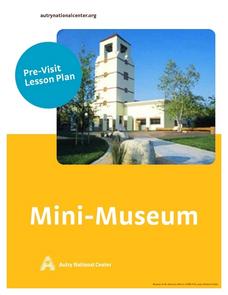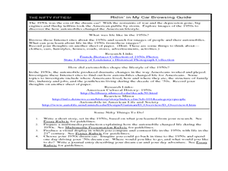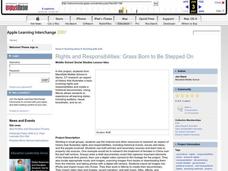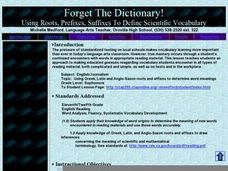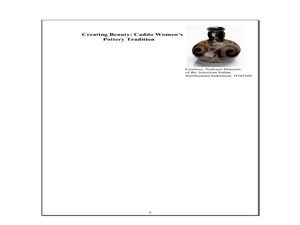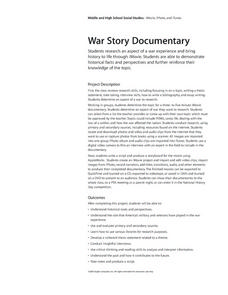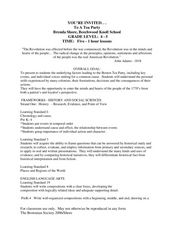Curated OER
Mini Museum
Students brainstorm about the different types of museums and complete a worksheet by looking at artifacts and what they think that object did. They work together in groups to complete a KWL chart throughout the lesson.
Curated OER
Critical Thinking About Government
Students research the Comox Band's system of government and report on what kind of government they think would work for them. In this government lesson plan, students decide between a hereditary system or an election system of...
Curated OER
Wings, Chrome, and Tailfins: Automobiles of the 1950s
Pupils study the automobile industry. For this cultural history lesson, students explore 1950s America as they view a teacher-created PowerPoint presentation regarding the 1950s. Pupils research how the automobile changed the 1950s...
Curated OER
Escaping the Holocaust: Incorporating the Voyage of the St. Louis
Students research passengers aboard the St. Louis to explore the difficulties Jewish refugees faced when fleeing Nazi Germany. They research print and online resources, construct histories of individual passengers on the St. Louis.
Curated OER
Rights and Responsibilities: Grass Born to Be Stepped On
Young scholars use the Internet and other resources to research an aspect of history that illustrates rights and responsibilities, including historical events, issues and ideas, and the people involved.
Curated OER
How Historians Know: Investigating a Midwife's Life
Students view "A Midwife's Tale" to explain the methods historians use to study the past. They complete worksheets to identify what historians look for.
Curated OER
Migrating to Texas
Fourth graders explore the migration to Texas from other parts of the United States. Through journal entries they write about the trip as if they were the settlers coming to a new and foreign country. Working in small groups, 4th graders...
Curated OER
Forget The Dictionary!
Accessing Web sites and playing interactive word games enliven the study of Greek, Latin and Anglo-Saxon roots and affixes. Alas, the link to resources appears broken. Take some time to find game links.
Curated OER
1880s Agricultural Nation: Foods and Families on the Move
Students complete activities to learn about the agriculture during the 1880s. In this agricultural history lesson plan, students discuss the brainstorm questions about their neighborhood and its agricultural history. Students research to...
Curated OER
Indian Women in Texas History
Fourth graders study Indian women in Texas. In this US history instructional activity, 4th graders discuss what each Indian woman's contribution was by completing a timeline and table. Students examine the Caddo Women's pottery tradition...
Curated OER
Documenting Texas Women’s History through Photographs
Students explore women’s history. In this women’s studies lesson, students will examine seven photographs that depict prominent female figures from Texas’s history. Students will engage in a discussion of the photographs as a mode of...
Curated OER
The Embodied Presidency
Tenth graders analyze Roosevelt's Fireside Chats. In this Franklin D. Roosevelt presidency, 10th graders determine how well FDR's government programs aided victims of the Great Depression. Students examine selected Fireside Chats and...
Curated OER
Scaffolded Reading of "Drawing of an African Burial Ground Grave in Situ"
The class reads the description of the "Drawing of an African Burial Ground Grave In Situ" then completes a work sheet. They act like archaeologists and answer a series of critical thinking questions to better understand the historical...
Eastconn
Learning to Analyze Political Cartoons with Lincoln as a Case Study
Discover the five main elements political cartoonists use—symbolism, captioning and labels, analogy, irony, and exaggeration—to convey their point of view.
Curated OER
War Story Documentary
Middle schoolers review research skills and determine an aspect of war to research. They research an aspect of a war experience and bring history to life through iMovie.
Curated OER
War Story Documentary
Students research and create an aspect of a war. They practice on writing a bibliography and essays.
Curated OER
Past and Present
Pupils research their community history and choose on aspect to create an iMovie on. They use digital photographs and old images of community place that show how they have changed.
Curated OER
The Industrial Age in America: Robber Barons and Captains of Industry
Middle schoolers define terms "robber baron" and "captain of industry," list positive and negative actions of one or more captains of industry/robber barons, and take and support stand as to whether particular financier/industrialist is...
Curated OER
The Treaty Trail: Examining an Artist's Perspective
Elementary school leanrners examine artwork from the time period of the United States and Native American treaties. They discuss the causes and effects of the treaties being signed. They also examine how cultural perspective influences art.
Curated OER
The Causes of Prohibition
Eleventh graders explore the origins of the Prohibition Movement in the United States. In small groups, they analyze the influence of World War I in the passage of the eighteenth amendment. Students explain how different demographics of...
Curated OER
Pet Food Safety A Con
Students use the internet to research pet food safety laws. In groups, they examine what happened during the pet food recall earlier this year and what is being done to improve the situation. They write a news feature story including...
Curated OER
You're Invited...To A Tea Party
Kids read the book Boston Tea Party by Steven Kroll and use maps to locate various landmarks. They identify the cause and effect of the events related to the Boston Tea Party, then write a descriptive composition.
Curated OER
Library Skills: Biography
Biographies deserve special attention when training youngsters how to use the library because they are alphabetized by subject rather than by author. Guide children through the process of finding biographies over a two-visit series. On...
Curated OER
Change of Perspective
After reading an example of a Cultural Connection about a particular person, class members are asked to think about what this person might experience on a daily basis. They then craft a narrative from the subject’s point of view.
Other popular searches
- Primary and Secondary Sources
- Primary Secondary Sources
- Primary vs Secondary Sources
- Primary & Secondary Sources
- Primary, Secondary Sources
- Teaching Secondary Sources
- Primary vs. Secondary Sources


